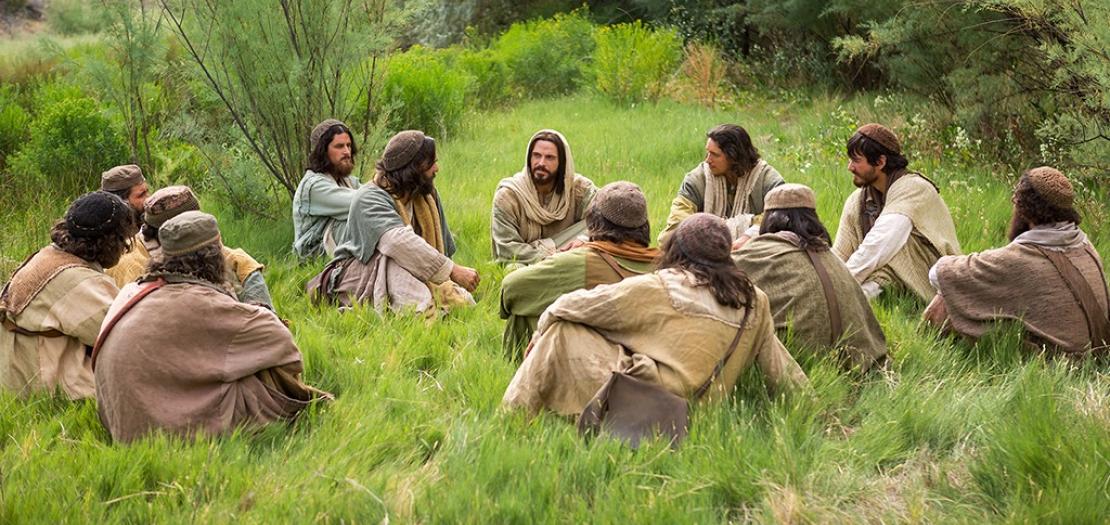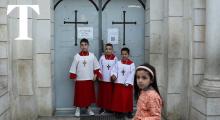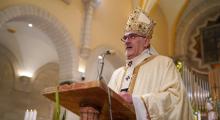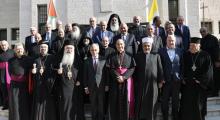Issued by the Catholic Center for Studies and Media - Jordan. Editor-in-chief Fr. Rif'at Bader - موقع أبونا abouna.org

Following is the text of the meditation by Latin Patriarch of Jerusalem His Beatitude Pierbattista Pizzaballa for the fifth Sunday of Easter Season, May 15, 2022, Year C:
The Gospel passage we hear today (Jn 13:31-35) is taken from chapter 13 of the Gospel of John, where the evangelist places the story of Jesus’ last supper with His disciples, and it’s not immediately understandable if we remove it from its context.
After the shocking gesture of the washing of the feet, John relates Jesus’ announcement of the betrayal by Judas (13:21). They follow the verses we hear today with the words about the new commandment, and then a new announcement of defection, which, this time, concerns Peter and his denial (13:36).
He places the new commandment between two betrayal announcements. And this is the first element on which we dwell because Jesus will ask His disciples to love each other in the same way, with the same measure with which Jesus loved them (“I give you a new commandment: that you love one another. As I have loved you, so you also must love one another”- 38).
And the measure is given by the distance that the disciples put between them and the Lord: an abysmal distance, that of sin, which Jesus fills with His free love. He does not leave His disciples wandering in the distance where they are lost, because, as we saw last Sunday, He is the Good Shepherd, and the Good Shepherd does not want any of His sheep to be lost. For this He gives life.
The evangelist John relates the denial of Judas with the words of Jesus proclaimed in today’s Gospel: it occurs when Judas takes the morsel and goes out that Jesus exclaims these strong words, apparently out of place: “Now the Son of man was glorified, and God has been glorified in him” (Jn 13:31).
What do they mean?
The whole of the Gospel of John leans to a mysterious “hour”, a moment in which God would have revealed Himself, His glory, in the life and work of the Son entirely. The hour has come just at this moment when Jesus can finally show all the love that He has come to give, a love that also reaches the disciple who denies and betrays, a love that for him provides life.
Judas has just gone out to betray his Lord, to deliver Him. But he did it after having received from Jesus the morsel destined for the beloved friend, after eating the bread of friendship in which all enmity is overcome.
And this is precisely glory for Jesus or the maximum possible love; by which also the gesture of Judas is re-read and accepted as a further possibility of loving, and therefore of giving glory to the Father.
The Father, in turn, will respond to this gesture of love and obedience by giving glory to the Son: as the love of Jesus reaches the disciples lost in their sin, so the love of the Father does not leave Jesus lost in death. “Immediately” (Jn 13:32), in fact, He will restore His life: “If God has been glorified in him, God will also glorify him for him and immediately glorify him.”
These words of Jesus, therefore, are placed in between these two betrayal stories, and they are like a hymn of victory, like a sure omen of salvation. Right within all this evil, the life of God is fully revealed.
Yet this is not yet everything.
Chapter 13, in fact, places at the center the two gestures of betrayal, thanks to which all the love of Jesus for man is manifested, gestures that anticipate and interpret what, a little later, happened on the cross, which gives it meaning.
But immediately after He asks His loved ones to love one another as He loved them: He loves them freely and, because of this gratuity, asks them to do the same.
The words of the new commandment can be placed only in the context of the Cross and, in John, only after those gestures that make sense of the Cross. Indeed, the disciples will not be able to love each other except by the love they have received.
The love of God is not something we return: we would never be able to give back to Him what He gave us.
The love of God is exchanged between us, it is circulated, and this is the only way in which we can love God, whereby we can tell Him our sincere thanks.
+ Pierbattista







